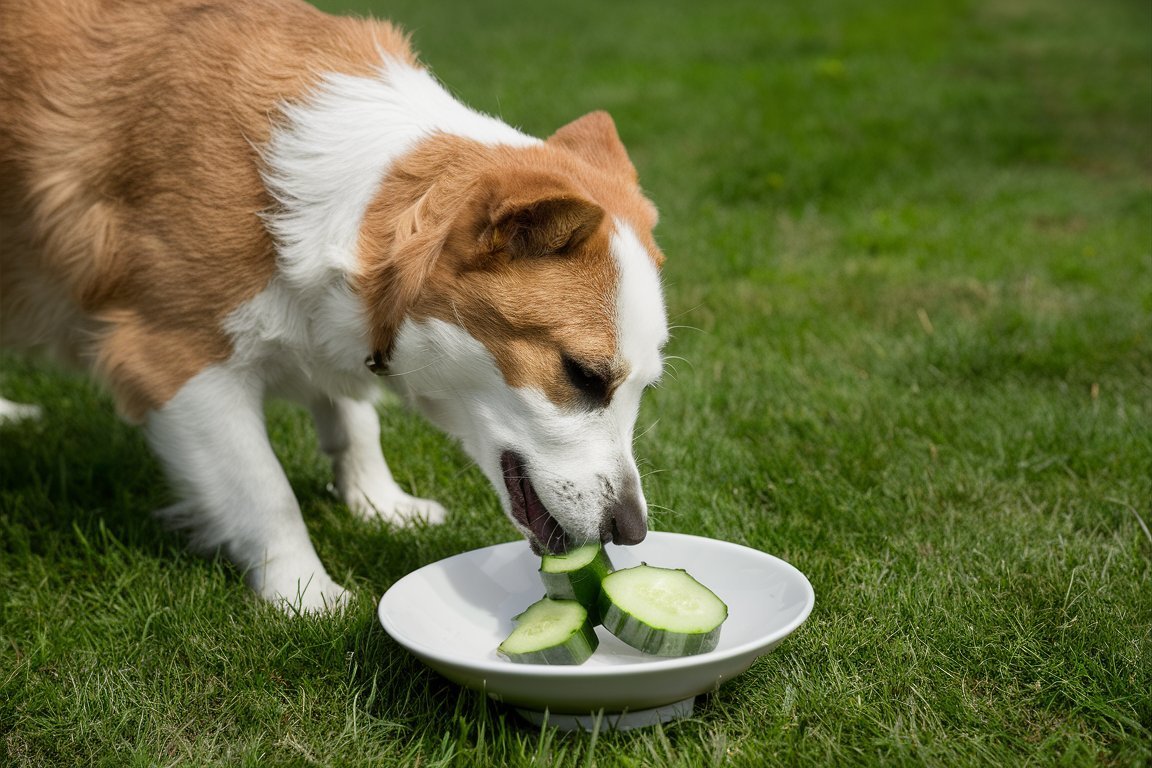Can Dogs Eat Cucumbers? A Comprehensive Guide
When it comes to feeding our furry friends, pet owners often wonder about which foods are safe and healthy for dogs. Among the many questions, “Can dogs eat cucumbers?” is quite common. The simple answer is yes, dogs can eat cucumbers, but like anything else, it should be done in moderation and with a few considerations in mind. This article will delve into why cucumbers can be a great treat for your dog, how to introduce them safely, and what benefits they offer. We’ll also provide some tips on how to serve cucumbers to your dog, ensuring they enjoy this crunchy, refreshing snack.
Why Cucumbers?
Cucumbers are a popular vegetable in human diets because they’re low in calories, high in water content, and rich in essential vitamins and minerals. But what about dogs? Are these benefits the same for our canine companions? The good news is that cucumbers are just as beneficial for dogs as they are for humans. Here’s why:
1. Low in Calories and Fat
One of the main concerns dog owners have when introducing new foods is the calorie and fat content. Cucumbers are incredibly low in both, making them a perfect snack for dogs, especially those prone to weight gain. A slice of cucumber contains only about 2 calories, so you can give your dog several pieces without worrying about overfeeding.
2. High Water Content
Cucumbers are made up of about 95% water. This high water content makes them an excellent hydrating snack for your dog, especially during the hot summer months. Just like us, dogs need to stay hydrated, and offering cucumber as a treat can help meet their water intake needs.
3. Rich in Nutrients
While cucumbers may not be a nutritional powerhouse, they do contain vitamins and minerals that can be beneficial to your dog’s health. Cucumbers provide Vitamin K, which supports bone health, and a small amount of Vitamin C and potassium. These nutrients contribute to a healthy immune system, better digestion, and overall well-being.
How to Safely Introduce Cucumbers to Your Dog
Even though cucumbers are generally safe for dogs, it’s essential to introduce them gradually and in the right way. Here’s a step-by-step guide on how to do it:
Step 1: Start with Small Pieces
When introducing cucumbers to your dog for the first time, start with small, bite-sized pieces. This will allow you to monitor your dog’s reaction to the new food and ensure they can chew and swallow it safely.
Step 2: Watch for Allergic Reactions
Although rare, some dogs may have an allergic reaction to cucumbers. After offering the first few pieces, keep an eye on your dog for any signs of discomfort, such as itching, swelling, or gastrointestinal issues. If you notice any of these symptoms, stop feeding cucumbers immediately and consult your veterinarian.
Step 3: Serve Fresh and Plain
Always serve cucumbers fresh and plain. Avoid adding any seasonings, oils, or dips, as these can be harmful to dogs. Also, make sure to wash the cucumber thoroughly to remove any pesticides or chemicals that might be on the skin.
Step 4: Remove the Seeds (If Necessary)
While most dogs can handle the small seeds found in cucumbers, some dogs might have difficulty digesting them. If your dog has a sensitive stomach, consider removing the seeds before serving the cucumber.
Benefits of Feeding Cucumbers to Dogs
Now that you know cucumbers are safe for dogs and how to introduce them, let’s explore the benefits of including this crunchy vegetable in your dog’s diet.
1. Weight Management
As mentioned earlier, cucumbers are low in calories and fat, making them an ideal treat for dogs that need to manage their weight. Instead of high-calorie commercial dog treats, offering cucumber slices can satisfy your dog’s need for a snack without adding unnecessary pounds.
2. Improved Hydration
Dogs can sometimes be reluctant to drink enough water, especially during cooler months. Cucumbers, with their high water content, can help keep your dog hydrated. This is particularly beneficial for dogs that are not fond of drinking water or those that live in hot climates.
3. Supports Healthy Digestion
Cucumbers contain fiber, which is essential for healthy digestion. Fiber helps regulate bowel movements and can prevent constipation. By including cucumber in your dog’s diet, you’re helping to support their digestive system.
4. Promotes Dental Health
The crunchy texture of cucumbers can help clean your dog’s teeth as they chew, reducing plaque buildup and promoting better dental health. While cucumbers shouldn’t replace regular teeth brushing or dental chews, they can be a helpful addition to your dog’s oral care routine.
Fun Ways to Serve Cucumbers to Your Dog
Variety is the spice of life, and this applies to your dog’s diet too! Here are a few creative ways to serve cucumbers that your dog will love:
1. Frozen Cucumber Treats
On a hot day, try freezing cucumber slices for a refreshing treat. The cold crunch will be both hydrating and cooling for your dog.
2. Cucumber and Peanut Butter Bites
Spread a thin layer of peanut butter on cucumber slices for an extra special treat. Just be sure to use peanut butter that doesn’t contain xylitol, which is toxic to dogs.
3. Cucumber and Dog Food Mix
Dice cucumbers into small pieces and mix them with your dog’s regular food. This can add a bit of variety to their meals and make their dinner more exciting.
4. Cucumber Salad (Dog-Friendly)
Create a simple salad by mixing cucumber slices with dog-friendly fruits like blueberries and apple slices. This can be a fun and healthy side dish for your dog’s meal.
When to Avoid Feeding Cucumbers to Your Dog
While cucumbers are generally safe, there are a few situations where you should avoid feeding them to your dog:
- Choking Hazards: Large pieces of cucumber can be a choking hazard, especially for small dogs. Always cut cucumbers into appropriately sized pieces for your dog.
- Underlying Health Conditions: If your dog has a specific health condition, such as a gastrointestinal disorder, it’s best to consult your veterinarian before introducing cucumbers or any new food.
- Pesticides and Chemicals: Always wash cucumbers thoroughly before serving them to remove any pesticides or chemicals. Alternatively, you can peel the cucumber to reduce this risk.
Final Thoughts
In conclusion, cucumbers can be a healthy and refreshing treat for your dog. They’re low in calories, high in water content, and provide some essential vitamins and minerals. However, as with any treat, they should be given in moderation and introduced slowly to ensure your dog can tolerate them.
If you’re looking to add some variety to your dog’s diet, cucumbers are a great option. They can be served in many fun and creative ways that your dog will enjoy. Just remember to always supervise your dog when trying new foods and consult your vet if you have any concerns.
Next time you’re enjoying a crisp, refreshing cucumber, feel free to share a few pieces with your furry friend—they’ll likely thank you with wagging tails and happy barks!
By adding cucumbers to your dog’s treat rotation, you’re not only giving them a tasty snack but also contributing to their overall health and well-being. So go ahead, give your dog a slice of cucumber, and watch them enjoy this crunchy, nutritious treat!

